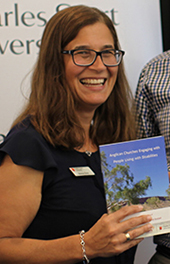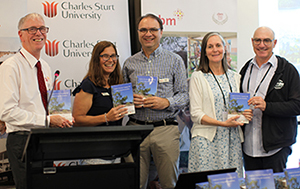A new book by a CSU researcher about church engagement with people with disabilities was launched at an annual meeting of Anglican bishops yesterday.
 A new book by a Charles Sturt University (CSU) researcher about church engagement with people with disabilities was launched at an annual meeting of Anglican bishops yesterday.
A new book by a Charles Sturt University (CSU) researcher about church engagement with people with disabilities was launched at an annual meeting of Anglican bishops yesterday.
Anglican Churches engaging with people living with disabilities by Ms Monica Short (pictured left), a lecturer in social work in the CSU School of Humanities and Social Sciences, was launched at the National Bishops’ Meeting in Canberra on Monday 19 March.
The annual Meeting is held in different locations in Australia and was attended by bishops from all 23 dioceses of Australia.
Ms Short said, “This book is the second in a series about the Anglican Church of Australia and its engagement, focusing on people with disabilities living outside capital cities.
“It addresses the questions, how does the Anglican Church of Australia outside capital cities engage with people living with disabilities, and what are the intentions, impacts and implications of these engagements?”
Ms Short’s research involved actively engaging with 20 people living with disabilities from six churches located within the Anglican Diocese of Canberra and Goulburn − St Andrew’s Anglican Church Braidwood, Refresh F5 Goulburn, St Luke’s Anglican Church Junee, All Saints’ Anglican Church Marulan, St Jude’s Anglican Church Tumbarumba and Yass Valley Anglican Church.
“I was surprised by the level of agreement the people participating had about church engagements with people living with disabilities,” Ms Short said.
 “Their testimonies attest that these six churches are exemplars of successful engagement. The experiences of these churches offer direction for other churches who seek to improve their engagement. As the research progressed, many participants, partners and/or informants suggested key themes, recommendations and conclusions that were all included in this book.”
“Their testimonies attest that these six churches are exemplars of successful engagement. The experiences of these churches offer direction for other churches who seek to improve their engagement. As the research progressed, many participants, partners and/or informants suggested key themes, recommendations and conclusions that were all included in this book.”
Also in in the book is an essay by Dr Louise Gosbell from CBM Australia’s Luke 14 Program titled, ‘The experiences of people living with disability in three urban Anglican churches’. Dr Gosbell’s essay explained that each interviewed person had a strong sense of belonging to their urban church and participated in church activities.
A free copy of the book is available here or you can contact Mr Rob Nicholls at CBM Australia Luke 14 Program, or Bush Church Aid for a copy of the book.
Media Note:
Contact CSU Media to arrange interviews with CSU social work lecturer Ms Monica Short who is based in Sydney.
Photo at launch: (left to right): Mr Rob Nicholls, Church Relationship Manager, CBM Luke 14 Program; Ms Monica Short, lecturer CSU; Mr Mark Short, National Director, Bush Church Aid; Mrs Jane and Bishop Stuart Robinson, The Anglican Diocese of Canberra and Goulburn.
Anglican Churches engaging with people living with disabilities by Ms Monica Short makes recommendations for rural Anglican churches, summarised below:
1. Members are encouraged to attend training programs and groups, such as mental health first aid training and disability support groups.
2. Leadership teams invite advice from both people living with disabilities and professionals, such as disability support groups, occupational therapists and social workers – about strategies for inclusion, access and engaging with people living with disabilities when planning rural activities and programs.
3. Churches identify and connect with disability services, support groups and networks in their local towns.
4. Churches aim to provide accessible pastoral care for all, regardless of distance.
5. Parish councils intentionally pray for and reflect on the demography of their rural towns and the population trends and needs of groups of people living with disabilities.
6. Churches, in partnership with people living with disabilities, intentionally establish a five-year vision that aims to identify, train and integrate Christians living with disabilities into all leadership teams and church activities.
7. Churches and congregation members intentionally and regularly invite rurally located people living with disabilities to church services and activities.
8. Leadership teams identify accessible town venues for regular accessible church activities.
9. Churches audit their rural environment and consider what effect dominant structures and attitudes have on people living with disabilities who attend church services and activities.
10. Churches be counter-cultural and assume people living with disabilities, regardless of diagnosis, have the ability to learn. Churches provide opportunities and support so people can participate in ongoing Bible studies, evangelism programs, theological studies and other similar activities.
11. People living with disabilities have opportunities to contribute regularly to church activities and rosters and to minister to others in their rural congregations.
12. Further research is available about church engagement, such as Dr Louise Gosbell’s project.
13. Church members celebrate all people and their faith and share stories with others about rural Anglican church engagements with people living with disabilities.







Social
Explore the world of social